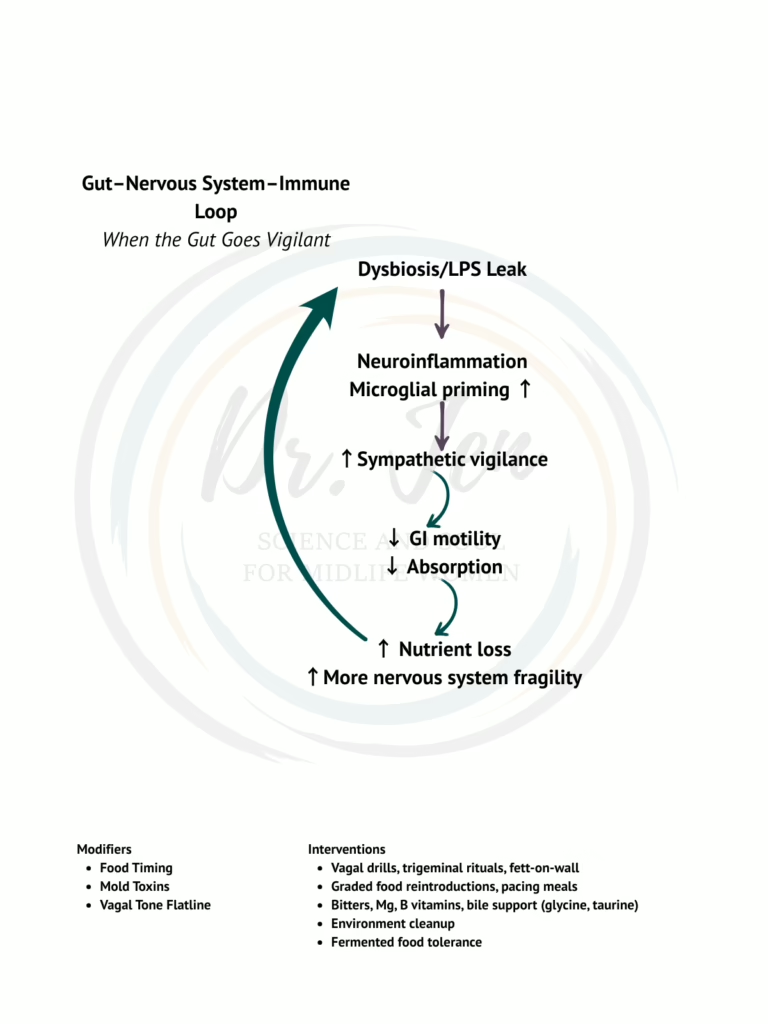🌕 Where nervous system wisdom rewrites the menopause playbook—part of The Reckoning Years series.
You used to be able to eat anything.
Pizza on Friday night, a glass of wine, leftover curry the next day—your body handled it.
Now soup makes you bloat. Enzymes leave you doubled over. Probiotics hit like dynamite. Even “healthy” meals turn traitor.
It’s easy to assume this is just what happens with age—your metabolism slows, your gut gets “weaker.” But that story is a lie. Midlife isn’t collapse; it’s exposure.
What’s happening is that your terrain has shifted—hormones, nervous system, immune tolerance—and your digestion hasn’t been given the new instructions. Your gut didn’t get the memo.

This Isn’t “Aging”
One of the cruelest tricks of midlife is being told that every symptom is “just aging.”
A woman in her early fifties told me she used to love eating out—pasta nights, Thai takeout, even just popcorn at the movies. Now she scans menus with dread, wondering which bite will leave her doubled over. Her doctor shrugged and said, “That’s menopause for you.”
But that’s not decline. That’s miscommunication.
Your gut is still capable. The problem isn’t age—it’s that the signals it listens for—hormones, nervous system tone, immune tolerance—have changed. If you don’t recalibrate those signals, every meal feels like a minefield.
The Terrain Roots of Menopause Gut Health
Digestion doesn’t fail out of nowhere. It falters because the terrain that used to buffer you has thinned.
Estrogen and progesterone shifts. These hormones don’t just regulate cycles—they modulate gut motility, microbiome composition, and immune tolerance. When they drop, motility slows, microbial balance wobbles, and food that was once fine now provokes reactivity.
Nervous system overdrive. Sympathetic dominance shuts down digestion first. If your body never gets the memo that it’s safe, blood flow stays in your muscles instead of your gut. The result: bloating, cramps, and “food fear,” even from safe meals.
Barrier confusion. Inflammation and permeability mean the gut wall no longer distinguishes clearly between nutrients and noise. That’s why you can react to spinach one day and oatmeal the next. It’s not random—it’s immune static.
Microbiome drift. The midlife gut is often less diverse, less resilient. Add antibiotics, stress, or poor sleep, and the ecosystem tilts toward chaos. Without microbial stability, digestion feels like a roulette wheel.
None of this is inevitable decline. It’s terrain asking for recalibration.

🌟 Through the Vital Clarity Code Lens
Here’s how the Vital Clarity Code translates gut chaos into signal.
🌱 Regulate
Digestion can’t thrive in chaos. Start by anchoring your system in rhythm. Light in the morning, dark at night, consistent meals that don’t spike blood sugar. Eat sitting down, not scrolling. Take three slow breaths before you lift your fork—your vagus nerve needs the cue. These aren’t “food rules.” They’re ways of telling your gut: it’s safe to digest.
🌀 Rewire
Once regulation takes hold, you begin to retrain. Rewire motility by moving your body—not with punishment workouts, but with daily walking, twists, and stretches that wake up peristalsis. Rebuild receptor sensitivity with nutrients that matter: magnesium, glycine, minerals, and protein that stabilizes repair. Layer in microbiome support gradually—not with a probiotic bomb, but with fiber variety, fermented foods, and foods your system can tolerate without revolt. Rewiring is about restoring the communication lines, not flooding the channel.
🔥 Reclaim
Reclaiming digestion means refusing to let food fear dictate your life. A flare isn’t proof that your gut is broken—it’s proof that your system is signaling. Stop blaming yourself, stop blaming the meal. Start asking: what static is my body pointing to? That shift—seeing symptoms as data instead of defect—turns meals from battlefields into experiments.
✨ Resonate
Resonance shows up slowly. A meal that once bloated you now lands without consequence. You go out with friends and notice laughter instead of guarding your stomach. Foods stop feeling like enemies. The rhythm of digestion returns—not perfect, not rigid, but trustworthy. That’s coherence. That’s your gut getting the memo at last.
🪶 Micropractice: The Pre-Meal Reset
Before your next meal, pause. Place one hand on your chest, one on your belly. Inhale through your nose for four counts, exhale slowly for six. Repeat three times.
This simple act signals your vagus nerve, shifts you out of bracing, and reminds your body: we’re safe enough to digest now. It’s not about the food—it’s about the terrain that receives it.
Why Diet Alone Won’t Fix This
You can’t “eliminate” your way back to health.
You can cut out gluten, dairy, sugar, nightshades—and still be bloated. Because food isn’t the root. Terrain is.
Without addressing nervous system tone, hormone signaling, and immune clarity, restrictive diets just shrink your world. The goal isn’t fewer foods—it’s more freedom.
TL;DR
Menopause gut health problems aren’t random intolerance. They’re signals that your terrain has lost margin.
Your gut reacts because hormones, nerves, and immune clarity have shifted.
Ignore the map and the reactivity keeps spreading.
Read it, and you rebuild tolerance, rhythm, and trust.
👉 Ready to clear the static? Start with a Vital Signal Check →
This post lives within the Menopause Hub, where we decode hot flashes, sleep changes,
weight shifts, libido, and brain fog through the lens of capacity, metabolism & the nervous system.
